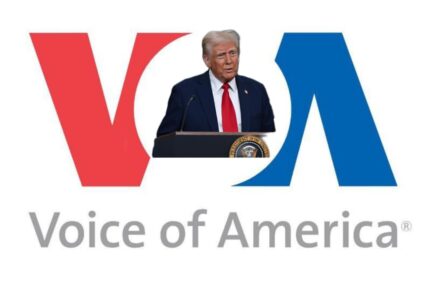President Donald Trump has issued an executive order to dismantle the U.S. Agency for Global Media (USAGM), effectively shutting down Voice of America (VOA) and other government-funded media organizations. The move has placed more than 1,300 Voice of America employees on administrative leave, silencing an institution that has operated for 83 years as a global voice for press freedom and democracy.
The decision affects other key USAGM entities, including Radio Free Europe/Radio Liberty and Radio Free Asia, which have been instrumental in providing independent news to regions dominated by state-controlled media. The White House has justified the order by accusing Voice of America of bias, branding it “The Voice of Radical America.” This claim echoes longstanding criticisms from conservative figures who argue that U.S.-funded media outlets have strayed from their original mission of countering propaganda from authoritarian regimes.
Reactions: Outrage Over Press Freedom Concerns
The executive order has sparked widespread backlash from media advocates, press freedom organizations, and international leaders who warn that the move undermines America’s commitment to independent journalism. The National Press Club condemned the action, stating, “If an entire newsroom can be sidelined overnight, what does that say about the state of press freedom?”
Mike Abramowitz, Voice of America’s director, criticized the decision, noting that it “cripples our ability to fulfill our vital mission, especially when adversaries like China, Iran, and Russia invest billions in disinformation.” He expressed concern that silencing VOA would leave a significant information gap, making it easier for authoritarian regimes to control narratives in key regions.
The Czech Republic’s Foreign Minister, Jan Lipavský, urged the European Union to find ways to keep Radio Free Europe/Radio Liberty operational in Prague, emphasizing its role in countering Russian disinformation campaigns.
Elon Musk and the Push to Cut Government-Funded Media
Elon Musk, who has been leading the Department of Government Efficiency under Trump’s administration, has strongly supported the decision. Using his social media platform, X, Musk argued that government-funded media is “outdated and unnecessary,” claiming taxpayers should not be funding what he describes as biased journalism.
Musk’s support for the move aligns with the broader conservative push to shrink government spending, particularly in sectors viewed as unfavorable to right-wing political narratives. His involvement has further fueled speculation about his increasing influence over Trump’s policy decisions, especially in areas related to media, technology, and government restructuring.
Impact on Other Federal Agencies
Trump’s executive order extends beyond media, targeting other federal institutions as part of a broader initiative to reduce the size of the government. Agencies affected include the Woodrow Wilson International Center for Scholars, the Institute of Museum and Library Services, and the U.S. Interagency Council on Homelessness.
Critics argue that defunding these agencies signals a larger effort to weaken institutions that contribute to public knowledge, historical preservation, and social welfare. “This is not just about cutting costs,” said a senior Democratic lawmaker. “This is about dismantling institutions that uphold American values and serve as pillars of democratic governance.”
Historical Context: The Legacy of Voice of America
Founded in 1942, Voice of America was established to counter Nazi and Japanese propaganda during World War II. Its first broadcast, aired from a transmitter loaned by the BBC, stated: “The news may be good or bad. We shall tell you the truth.”
Over the decades, Voice of America evolved into a vital source of reliable information for people living under authoritarian regimes, with its public charter—signed by President Gerald Ford in 1976—ensuring editorial independence. The agency’s influence expanded after the Cold War, with its affiliated broadcasters serving as a counterweight to state-controlled media in China, Russia, and the Middle East.
With Trump’s decision to shut it down, critics fear the U.S. is abandoning a key tool of soft power that has long projected American values of free speech and democracy worldwide. Whether Congress will intervene to reverse the order remains uncertain, but for now, Voice of America and its affiliated stations face an uncertain future.














